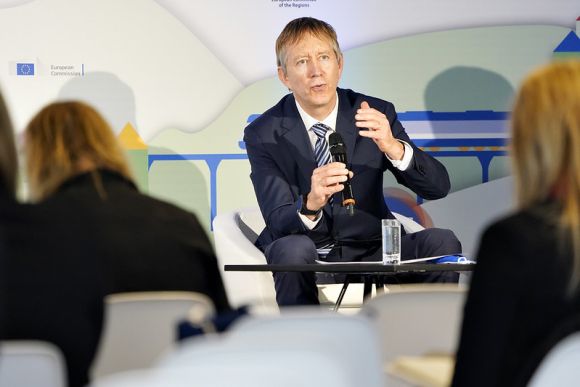
Whilst diplomatic ties remain cold and restrictive measures are reinforced, the shared interests of regions within the EU and Russia motivate joining forces. This is achieved through bottom-up cooperation within the Interreg format.
Relations between the European Union and Russia have remained strained since the latter’s annexation of Crimea in 2014. On a press conference mainly addressing responses to the COVID-crisis within the Interreg-programs, Jean-Pierre Halkin, Head of the Unit of Macro-Regions at the European Commission, addressed these relations - calling them “complex and intense”:
- Sanctions have been reinforced after different political events, the latest being what we consider to be the poisoning of Alexei Navalny. Despite this, The European Union has decided to keep one channel of cooperation open with Russia: cross-border cooperation.
These cross-border projects are part of EU’s so called ‘selective engagement approach’ to the bordering Nations. The economic engagement is limited to co-joint environmental efforts and projects which aim to better the social relations along the land borders. They operate through the same framework as Interreg-projects within the Union, offering an “EU-toolbox” to bordering Nations.
As such, the EU has no direct diplomatic engagement through the projects, which are instead run by the national states and regions directly involved.
- We are working with the Member States bordering to Russia; such as Finland and Poland, which have a long and largely prosperous history of cooperating with Russia, said Jean-Pierre Halkin.
The Poland-Russia border program aims to “support cross-border cooperation in the social, environmental, economic and institutional sphere” while the aims for the South Finland-Russia border project is to “contribute to economic and social development, growth and well-being of the regions and their inhabitants, mitigate common challenges and promote mobility of the border regions”.
Jean-Pierre Halkin explained that the inclusion of Russia in Interreg projects hold two main motivators: meeting immediate needs, such as limiting the pollution of the Baltic Sea, and to adhere to a less immediate political vision:
- We hope that, in the long term, the relations between the EU and Russia will improve and, in that context, we believe that it is important to keep providing a signal. We keep engaging with the Russians in a way that will favor a restart once the political relations improve.
Nathalie Verschelde, Deputy Head of Unit for Interreg, underlined the necessity of bilateral cooperation with bordering Nations - setting diplomatic differences aside:
- It is easy to see the relationship on diplomatic terms, but the Russians do not live on another planet. We share spaces with them, like the Baltic Sea. The whole border between Finland and Russia is a continuous piece of land and at that level it actually works quite well if we agree in advance on what we want to change. It could be that we want less plastic or pollution in the Baltic sea – then we co-finance those projects which engage bottom up-organization. If you work like that it works. It is on a different level than what happens between Moscow and Brussels.
by Carolina Lundin (Sweden)



